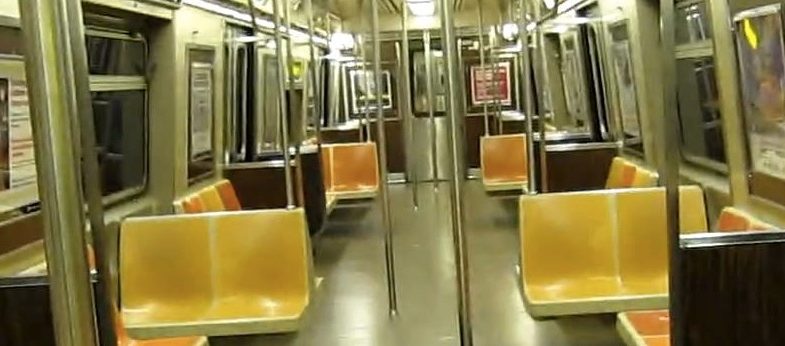“Is this seat taken?”
Joel looked up from his copy of The Brothers Karamazov to the person asking. Of indeterminate gender, with a slight female cast, s/he wore a natty suit cut well to their slight frame. S/he was smiling with small, perfectly white teeth, a bob in their hair swooping down to frame their mouth.
That was all fine and well but Joel had picked the empty train car so he could read his book in peace. Too many people brought up thoughts about the failings of his life and for a short period, while he travelled to his third shift job, he just wanted to sink into the other world that Dostoevsky’s work offered.
Joel made a show of the compartment’s vacancy by scanning it with a craning of his head. This circuit completed he looked the stranger in the eye and stated plainly, “You can have any seat in the car.”
S/he smiled with just an up-ticked corner of the mouth as if Joel’s answer was pleasing. “So I can.” Annoyingly, s/he sat down in the seat immediately in front of Joel and turned to face him. He made a show of returning to The Brothers, opening it so wide that he nearly broke the spine, lifting himself slightly from his seat and resettling in it.
Still, s/he persisted with a, “Good book?” He grunted an an affirmative reply. He could feel rather than see their smile, it giving off a radiance like a lightbulb he wasn’t facing coming on. “You know,” s/he continued, “there’s a new trend on the West Coast called dopamine fasting. It’s for people who supposedly experience too much pleasure in their lives: constant social media approval, jobs they love, too many adoring members of the opposite sex. Having all that happiness floating around, it deadens them to pleasure, so they go into a sensory deprivation.”
“But you don’t have that problem, do you Joel?”
The question hit Joel’s concentration like a ball-peen hammer, cracking it into shards that completely obscured the words of his book. Picking his way through those fragments, he slowly raised his head. “How do you know my name?”
“I’m Aggie,” she said, settling the question of gender in Joel’s mind, putting down a new structure where the old of one of his story had been. She extended a manicured hand, nails neat and bright.
Joel took her hand, not letting it go after he shook it. “Typically, this is the part where I tell you my name, but you already know it.”
Aggie didn’t try to take her hand back, allowing Joel to hold it hostage. “I know you’re name because I need your help.” She produced a slow, confident smile that, like everything else about her, spoke of success. With one glossy nail, she pointed to her own lapel. “Plus, it’s on your access card.”
Joel glanced at his own chest where he wore his lanyard, his corporate ID stenciled with his name. He let go of Aggie’s hand, feeling foolish and out-smarted. Then he recalled what else she had said. “What do you mean, you need my help?”
“There’s a house, not far from the depot where you exit for work. It’s a nice place, big and roomy, filled with a kind of old style.” Aggie watched the landscape pass outside the train window, but Joel could see her picturing the house in her mind. “It’s really quite lovely.”
Preempting his next question, she pronounced with utter seriousness. “It’s also quite haunted.”
With what had been planned as a peaceful train ride now completely derailed, Joel made one final attempt to get his reading time back. “Are you serious?”
“Completely.” Aggie brought her eyes and her smile back to Joel. “It’s a Class-4 specter. A psychic parasite. The Chinese call them quỷ đói. Literally ‘hungry ghost’.”
Joel felt his incredulity display itself on his face. If this were somehow missed, he projected it with, “A what?”
“Hauntings take all different kinds, Joel.” Aggie continued as if she were the instructor in a classroom. “This one locks onto the home’s inhabitants and drains them of happiness.” Aggie’s eyes became pools of empathy as she asked, “Can you imagine living with such a thing? Or buying a home and discovering the place meant to be your sanctuary is the worst place for you?”
Aggie placed her hands on the back of her chair and leaned towards Joel. “But you wouldn’t have that problem, would you?”
“What do you mean?”
The clinical detachment her words began in ramped up to something like sharped interest as Aggie went on.“You’re experiencing anhedonia. Taking care of your mother, paying your bills, the plastic corporate job, the loss of faith when your father passed – all of these things have overridden your capacity to feel joy.”
While that was true for Joel, he could experience fear. Having his current mental landscape so accurately recounted to him by someone who appeared enthused by it set off a twinge in his chest, a physical sounding of his anxiety at being alone with this individual. “How do you know all that?”
“I know that because I’ve been looking for you, Joel. Or someone like you.” She smiled. “I’ve been hired by a very wealthy client who’s recently purchased the home and is smart enough to believe in things like Class-4 specters. He’s hired me to get rid of it.”
“That’s enough,” Joel made to rise but was stopped by Aggie producing a stack of dollar bills, neatly banded together. She dangled it between them.
“I need your help to complete the job. So, naturally, I’ll share the reward.”
The money had its intended effect, replacing Joel’s disbelief with self-interest. “And how would I help?”
“You move into the house. You can bring your mother.” Aggie paused, then added, “In fact, it would be better if you brought your mother.”
“Then what?”
“That’s it. You live there. Your,” Aggie searched for words, perhaps seeking to be sensitive. “Your particular condition means the specter will have nothing to feed on. Eventually, it will move on or, if it’s tied to the house, simply cease to be.”
Joel eyed the currency strap, then Aggie. “You want me to help you kill a ghost?”
Aggie’s eyes rose in their sockets to contemplate the ceiling of the train car, then floated down again when she had retrieved whatever she was searching for there. “I suppose so, yes.”
The twinge in Joel’s chest returned, transformed from fear to something else, something he hadn’t felt in a long time. “Will it eat…the way I feel?” Will it take away this heaviness, he wanted to ask, will it pull off the shawl of numbness that has cloaked my life?
Aggie’s eyes softened as if she could sense the undertone of his question. “Oh, no. Even if it could, you’d be no good to me then. I need you just the way you are.”
Whatever was living in Joel’s chest now burned, the hope that had lived there combusting into a rancor at what felt like injustice. But then he eyed the money.
“Fuck it,” he pronounced the oldest of resolutions. “Why not?”
See the author’s published work here.
Related Posts
The American: Chapter 43 Next Post:
The American: Chapter 44
























